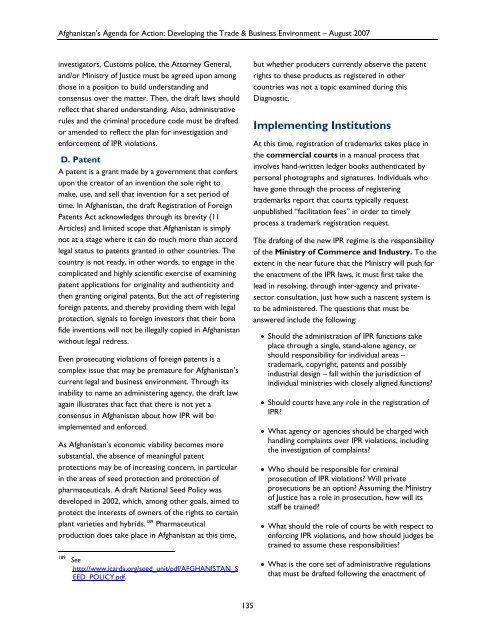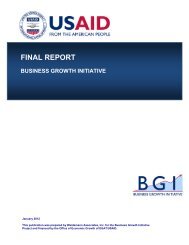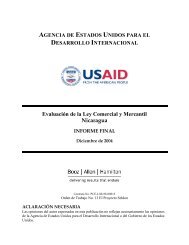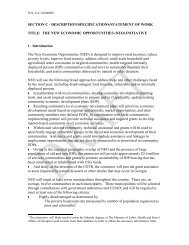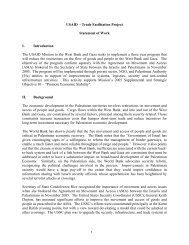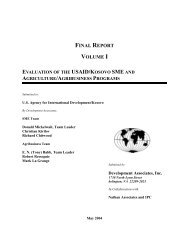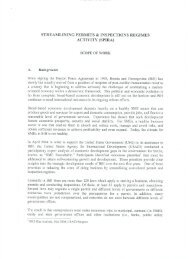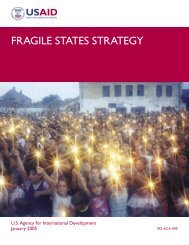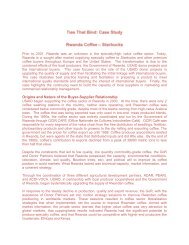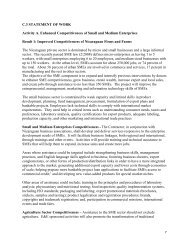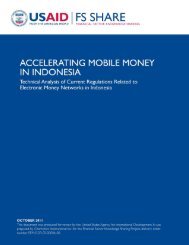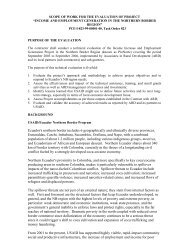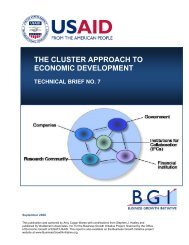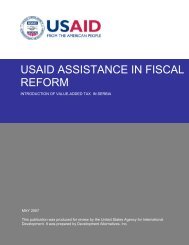Afghanistan's Agenda for Action - Economic Growth - usaid
Afghanistan's Agenda for Action - Economic Growth - usaid
Afghanistan's Agenda for Action - Economic Growth - usaid
Create successful ePaper yourself
Turn your PDF publications into a flip-book with our unique Google optimized e-Paper software.
Afghanistan’s <strong>Agenda</strong> <strong>for</strong> <strong>Action</strong>: Developing the Trade & Business Environment – August 2007investigators, Customs police, the Attorney General,and/or Ministry of Justice must be agreed upon amongthose in a position to build understanding andconsensus over the matter. Then, the draft laws shouldreflect that shared understanding. Also, administrativerules and the criminal procedure code must be draftedor amended to reflect the plan <strong>for</strong> investigation anden<strong>for</strong>cement of IPR violations.D. PatentA patent is a grant made by a government that confersupon the creator of an invention the sole right tomake, use, and sell that invention <strong>for</strong> a set period oftime. In Afghanistan, the draft Registration of ForeignPatents Act acknowledges through its brevity (11Articles) and limited scope that Afghanistan is simplynot at a stage where it can do much more than accordlegal status to patents granted in other countries. Thecountry is not ready, in other words, to engage in thecomplicated and highly scientific exercise of examiningpatent applications <strong>for</strong> originality and authenticity andthen granting original patents. But the act of registering<strong>for</strong>eign patents, and thereby providing them with legalprotection, signals to <strong>for</strong>eign investors that their bonafide inventions will not be illegally copied in Afghanistanwithout legal redress.Even prosecuting violations of <strong>for</strong>eign patents is acomplex issue that may be premature <strong>for</strong> Afghanistan’scurrent legal and business environment. Through itsinability to name an administering agency, the draft lawagain illustrates that fact that there is not yet aconsensus in Afghanistan about how IPR will beimplemented and en<strong>for</strong>ced.As Afghanistan’s economic viability becomes moresubstantial, the absence of meaningful patentprotections may be of increasing concern, in particularin the areas of seed protection and protection ofpharmaceuticals. A draft National Seed Policy wasdeveloped in 2002, which, among other goals, aimed toprotect the interests of owners of the rights to certainplant varieties and hybrids. 189 Pharmaceuticalproduction does take place in Afghanistan at this time,but whether producers currently observe the patentrights to these products as registered in othercountries was not a topic examined during thisDiagnostic.Implementing InstitutionsAt this time, registration of trademarks takes place inthe commercial courts in a manual process thatinvolves hand-written ledger books authenticated bypersonal photographs and signatures. Individuals whohave gone through the process of registeringtrademarks report that courts typically requestunpublished “facilitation fees” in order to timelyprocess a trademark registration request.The drafting of the new IPR regime is the responsibilityof the Ministry of Commerce and Industry. To theextent in the near future that the Ministry will push <strong>for</strong>the enactment of the IPR laws, it must first take thelead in resolving, through inter-agency and privatesectorconsultation, just how such a nascent system isto be administered. The questions that must beanswered include the following:• Should the administration of IPR functions takeplace through a single, stand-alone agency, orshould responsibility <strong>for</strong> individual areas –trademark, copyright, patents and possiblyindustrial design – fall within the jurisdiction ofindividual ministries with closely aligned functions?• Should courts have any role in the registration ofIPR?• What agency or agencies should be charged withhandling complaints over IPR violations, includingthe investigation of complaints?• Who should be responsible <strong>for</strong> criminalprosecution of IPR violations? Will privateprosecutions be an option? Assuming the Ministryof Justice has a role in prosecution, how will itsstaff be trained?• What should the role of courts be with respect toen<strong>for</strong>cing IPR violations, and how should judges betrained to assume these responsibilities?189Seehttp://www.icarda.org/seed_unit/pdf/AFGHANISTAN_SEED_POLICY.pdf.• What is the core set of administrative regulationsthat must be drafted following the enactment of135


